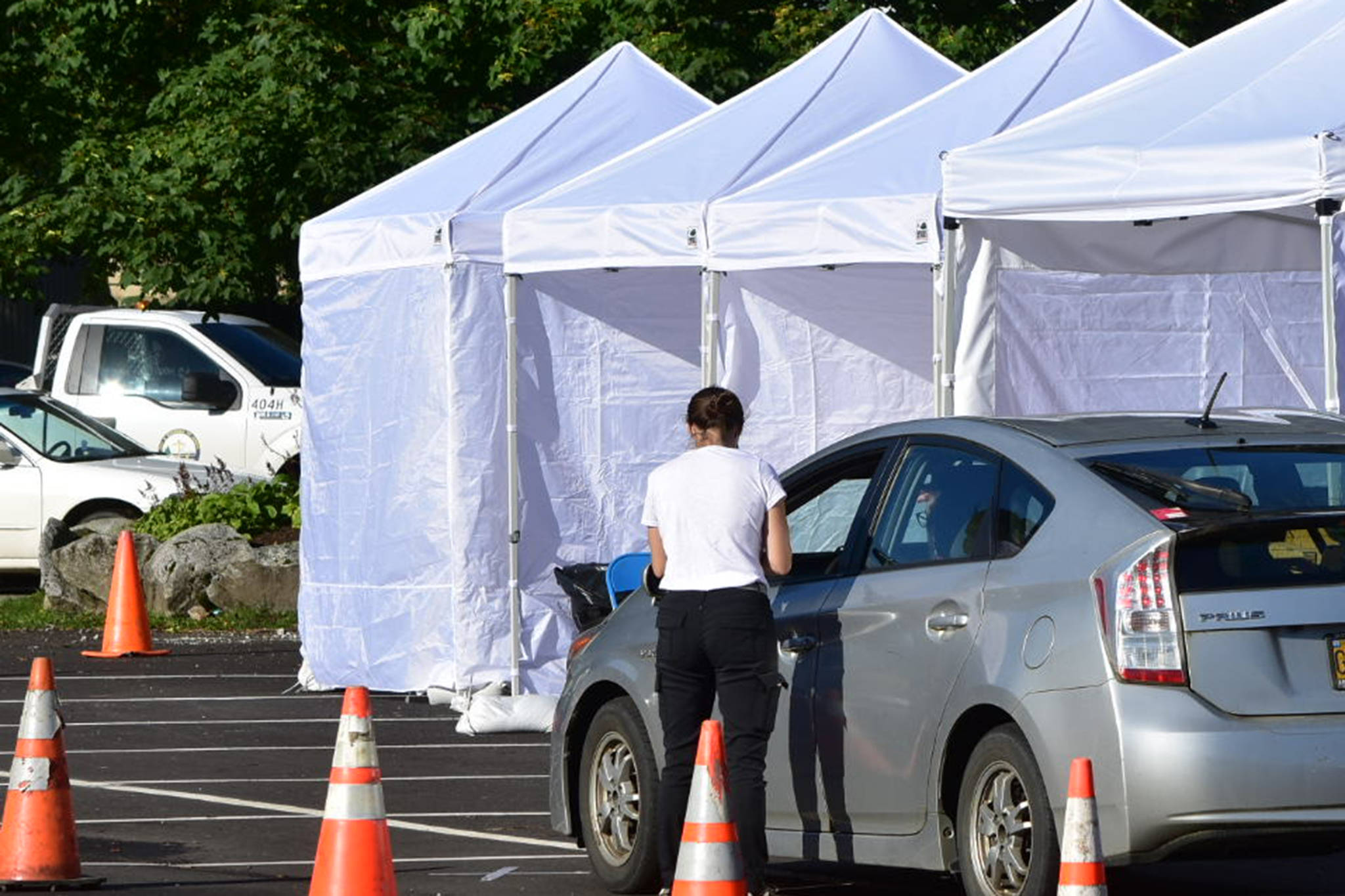Additional drive-thru COVID-19 testing centers will be set up at Centennial Hall over the weekend, as the City and Borough of Juneau tries to track an outbreak of the coronavirus among bar workers and patrons.
“We had a soft opening Wednesday for some folks who called ahead,” said Mila Cosgrove, head of the city’s emergency operations command.
CBJ put out an advisory Tuesday saying public health officials traced multiple positive cases back to a large social gathering that took place at the end of August, and several of those individuals worked in bars around Juneau. The city is advising anyone who socialized at a Juneau bar between Aug. 24 and Sept. 7, to seek testing even if they’re not showing any symptoms.
In response to high demand for testing, the city set up drive-thru testing centers in downtown Juneau in addition to testing site at the Hagevig Regional Fire Training Center set up earlier this year, the city announced in a news release Wednesday. No appointment is necessary, the release said, but long waits are expected.
The city’s testing center can normally process about 85 individuals a day, Cosgrove said, but officials ended up receiving up to 300 callers seeking testing. It was hard to say how long waits will be over the weekends, she said, because the city doesn’t know how many people are going to show up.
[Outbreak leads some bars, breweries to close]
“It’s difficult to say how long people will have to wait. We won’t know until it happens,” she said.
Self-swab testing is also being provided by the Southeast Alaska Regional Health Consortium at the Ethel Lund Medical Center at 1200 Salmon Creek Lane. Testing is available every Saturday from 10 a.m. to 2 p.m. and Sunday from noon to 4 p.m. according to Meagan Bosak, director of marketing for SEARHC, who said in an email the services are open to the public.
The city issued further clarification Wednesday saying the advisory covered people who socialized in any Juneau bar or bar area at a restaurant during those dates. Cosgrove told the Empire Wednesday the city wanted to cast as wide a net as possible in order to identify and trace any COVID-19-positive people.
Despite the increase in cases, the city’s overall community risk remained at Level 2 Moderate as of Thursday afternoon.
Both CBJ and the state have their own levels of risk assessment, and while the state’s assessment doesn’t have any restrictions built into it, the city’s does. But the city’s is also not tied to a single metric like the state’s. The state has a three-tiered alert system; low, intermediate, high, which is tied to average daily case rate per 100,000 people over a 14-day window.
The city’s assessment system uses 20 different metrics to determine a four-tiered risk level. The 14-day average is one of those, as are supplies of personal protective gear and health care capacity at Bartlett Regional Hospital.
“The hospital is doing fine, public health is doing fine,” Cosgrove told the Empire Thursday. “Our 7-day case average is higher which means things are trending upwards, but we talk with (State of Alaska Department of Public Health) every day.”
Cosgrove said the city was aware of other situations driving up numbers in the city, such as outbreaks among large family groupings. Those cases were isolating she said, and were of less concern than individuals who may be out in the community.
Each of Juneau’s risk level comes with its own set of restrictions and if Juneau’s level were to increase bars would be closed for indoor service and restaurants would be limited to 50% capacity, among other restrictions for other kinds of businesses. Of the metrics, the city monitors, only the 7-day case rate and containment situation have been raised to level 3, the other metrics remain at level 2 or lower.
The state reported 112 additional COVID-19 cases Thursday, 31 in Fairbanks, bringing the state’s 14-day average to exactly 10, on the line between intermediate and high alert levels. State data shows CBJ’s 14-day average at 10.94, putting the borough in the high alert level. According to the Department of Health and Social Services a high alert level means “widespread community transmission with many undetected cases and frequent discrete outbreaks is likely occurring.”
• Contact reporter Peter Segall at psegall@juneauempire.com. Follow him at @SegallJnuEmpire.

